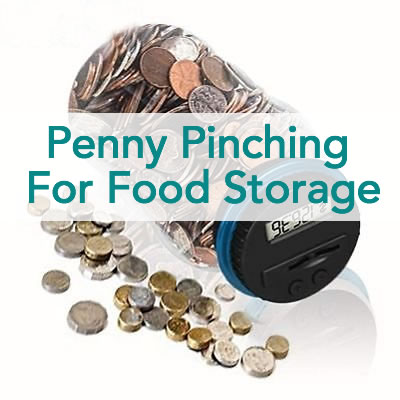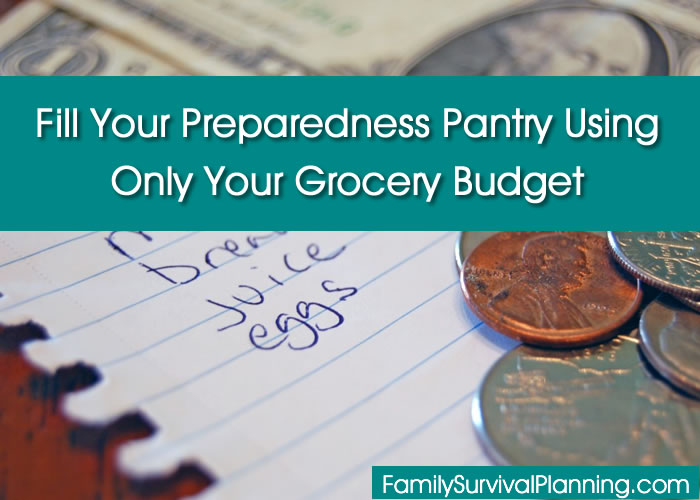
- HOME
- Financial Survival
- Money Saving Tips
20 Easy Money-Saving Tips

These easy money-saving tips were compiled to help you with your financial survival planning. Because of the uncertainty of the events happening around the world, it is necessary for us to live as frugally as we can.
Frugal living means budgeting carefully in order to keep food on the table, pay bills on time, and have a little (or a lot) left over to acquire food storage and survival supplies.
Invest in emergency food storage now and enjoy peace of mind for the next 25 years. Don't miss out on the savings!
Since money doesn't grow on trees . . . maybe it's time for all of us to be frugal with our money. Cutting back on eating out, vacations (stay-cations), and spending in general will help us learn to cut spending and save more because every little bit adds to our financial survival.
Life's Ups and Downs
I don't know how old you are but I've lived a few years (more than I am willing to admit!) and I've been through some hard times. I frequently thank my parents for a wonderful childhood. They look at me in amazement because, from their perspective, it was tough times. But we had food to eat, reasonably nice clothes to wear to school (not as many as the other kids), a comfortable, modest home, our own beds, fields to run in, the perfect dog, plenty of kitties to play with, and most of all a loving family.
What more could a child ask for?
Then several years into marriage and four kids later, my husband's employer just up and closed the company. Time and again he was told in job interviews that he was overqualified. We all know what that means - they don't want to PAY for your experience. We somehow got by for a whole year with part-time jobs, going without ANY extras, but still kept food on the table and the mortgage paid.
Life After Credit Cards
We couldn't pay anything on our credit cards, which we had charged to the hilt just to get by, so they asked us, not too politely, to cut them in half and mail them back. Obviously, they closed our accounts. Guess, what? We lived for many years after that without any credit cards. We paid cash for everything. If we didn't have the cash, we got along without the item until we had enough money.
We eventually started our own business, paid off all those credit cards, and avoided bankruptcy. Our credit worthiness was ruined (which we eventually rehabilitated), but we learned to live within our means. It was a very painful learning experience - for my husband and I as well as our children.
Living on less than your income means conserving in many areas. Learning to conserve puts you on the right track to financial survival. Eliminating all debt (except maybe your mortgage, or maybe that too!) will also ensure your financial survival.
20 Money Saving Tips

- The library is free. Go there for your entertainment. Check out DVD's, music CDs, and books. (Actually read together - WOW! What a concept!)
- Stop going out to eat - or go less often.
- Need a beer? Buy less and in smaller quantities. Cheap wine can be great too. (There are some seriously great wines for under $10/bottle.)
- Do your kids really need that toy? Put away several toys for a few months. When you retrieve them, they will play with them as if they are new. Then hide some others.
- Can you cut back on cell phone charges? Disconnect the home phone and only have a cell. Use the family plans that most service providers have available.
- Reduce your cable/satellite bill by going back to the "basic" plan. Or cut the cable altogether and spend a few dollars for a Roku or something similar and stream programs you like. You can also see some of your favorite TV shows on the internet for free.
- Can you increase your deductible on car insurance, thereby reducing your payments?
- Don't go to Starbucks for coffee.
- Brown-bag your lunch. (A little tip: cook your favorite foods in LARGE quantities, then put in serving-size containers and freeze; then lunches are a breeze - just grab and go.)
- When grocery shopping, only buy what is necessary. Try not to buy processed, packaged foods. Make a list and stick to it. Buy store brands - they taste just as good and cost less. Skip the temptation to buy anything that is not on your list or that "calls your name" at the checkout. (If you buy any extras, make it a can of something for your food storage.)
- Something broken? Fix it instead of buying new.
- Save coupons for groceries, oil changes, dental visits, haircuts (or learn how to cut hair yourself with a good electric clipper set. Cost - $15-$25). Subscribe to a coupon website - there are plenty out there.
- Shop the second-hand clothing stores or garage sales for huge savings. Buy undies and socks at discount stores, like Sam's Club or Costco.
- Wash your own car in the driveway.
- Watch sales for gift buying and needed items.
- Freeze leftover food then have a "restaurant night" with all the leftovers. Pretend you're the waitress/waiter and take the kids' orders. Tell them what's on the menu (or print one just for fun) and let them each choose different meals. Then just microwave your frozen leftovers and enjoy.
- Run the air conditioner a little higher and the heat a little lower. You can always put on more clothes or take off more clothes (uhhh . . . close the drapes!)
- Take the bus, ride a bike, or walk as many places as you can.
- Try to pay cash for everything - saves interest charged on credit card payments. Or charge everything on a credit card that accumulates points. Pay off the balance every month (be careful here about how much you charge on it), then use the points for gift cards at your favorite retailer or restaurant.
- Don't feel self-conscious or guilty about accepting donations of clothing, money, food or whatever. Just be gracious and say, "Thank you!"

















